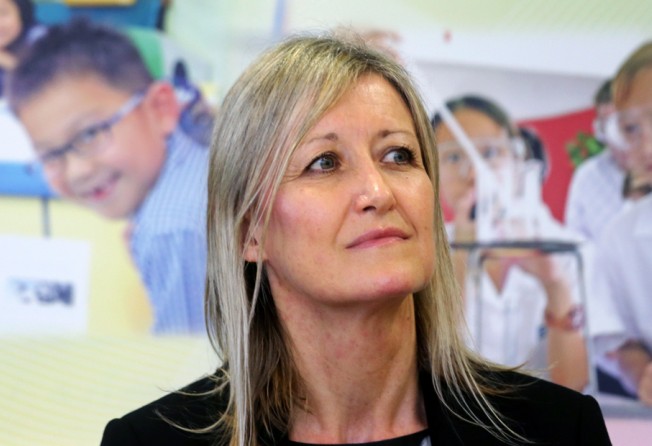Spend ESF subsidy on children with special needs, says foundation boss
Head of English Schools Foundation urges targeted reallocation of its HK$283 million subsidy government is about to withdraw

The government could strengthen education for children with special needs by reallocating the annual HK$283 million subsidy it will remove from the English Schools Foundation, ESF chief executive Belinda Greer says.
"There is a real need to strengthen that across Hong Kong," Greer said in an exclusive interview with the South China Morning Post.
She said there were "massive waiting lists" for the ESF's special school, the Jockey Club Sarah Roe School in Ho Man Tin, and learning support centres in other ESF schools.
The government's annual funding for ESF's Sarah Roe School and other learning support centres will be frozen at HK$28.3 million even after the subvention is phased out for its other schools from 2016.
Sarah Roe is a purpose-built international school for children aged five to 19 with severe learning difficulties. Greer said Sarah Roe and other support centres had an average of 100 children on each waiting list, and a child could wait five years for a place.
She hoped the government could work with the ESF and other local special schools to look at how to provide more places and better education for children with special needs.
The government could use the money saved from its decision to phase out its annual subsidy to ESF, she said.
"It's too great a cost if Hong Kong chooses to ignore meeting the needs of our most vulnerable children," Greer said.
Using the resources to improve the local education system should also be the Education Bureau's priority, said education sector lawmaker Ip Kin-yuen.
He said problems in the public education system, such as a low teacher-student ratio and a single, highly demanding curriculum for pupils of all abilities, had been "ignored for a long time".
He hoped officials could use the money to create a "level playing field" for all schools.
Greer said that if the government considered doing so, the foundation would be happy to share its experiences with local schools and work with them to improve the local curriculum.
"It's in Hong Kong's interest," said the former Scottish education inspector. "The economic future relies on attracting people and ensuring them we've got strong education in Hong Kong."
But Civic Party legislator Kenneth Chan Ka-lok, whose four daughters are at an ESF school, insisted the government should not have removed the subsidy.
Chan said the ESF should now act on parents' behalf as an interest group to lobby the government for affordable education.
“Somehow ESF isn’t very high-profile,” says Chan. “The former CEO ignored this, and the current one is struggling to balance the book. It’s rather meaningless.”
Chan says ESF has the bargaining power to lobby the government into reviewing its decision, because an increasing number of local parents have sent their children into its schools.
But Greer says she wants to form a “mature relationship” and “work on the same side” with the government to achieve the best education for the city, because she says the government is interested in listening to and learn from ESF.
“I don’t see any value in us lobbying the government,” she says.
But Simon Osborne, a former parent representative on the ESF board of governors, doubts the foundation would want the subvention back. “Not if it means the government interfering in its affairs, badgering them and demanding public accountability,” he said.
The government has made it plain that it is not interested in providing an affordable English language education across Hong Kong, and that ESF should not be distracted from educating children and get involved in political affairs, said Osborne.
Osborne, who resigned from the board because he disagreed that ESF should consider charging parents capital levies for its building costs, also doubts the government has any plan to make better use of the subvention other than putting it back into the general pocket. So far, the government has a fiscal reserve of HK$734 billion.
“Perhaps they’ll give the cash as additional education allowances to senior civil servants, so their children can benefit from even more first-class schooling,” he says.